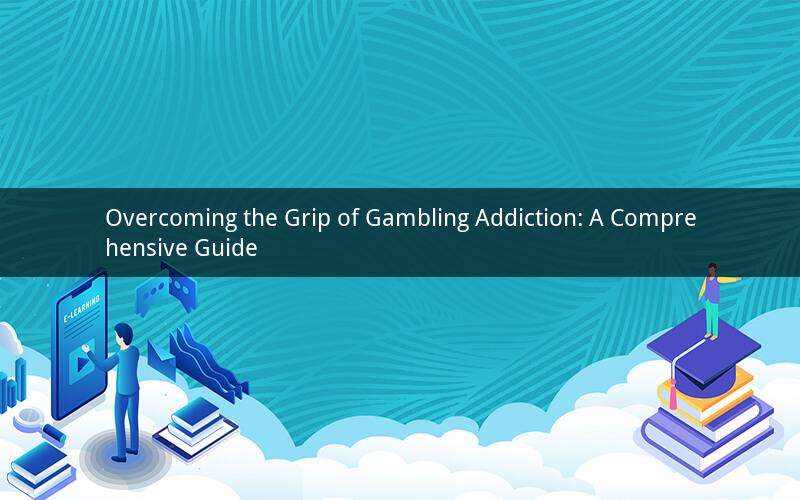
Gambling addiction, also known as problem gambling, is a significant issue affecting individuals, families, and communities worldwide. It is characterized by an inability to control gambling behavior, leading to negative consequences in various aspects of life. This article aims to provide a comprehensive guide on how to treat a gambling addiction, offering insights into the causes, symptoms, and effective treatment methods.
Understanding Gambling Addiction
Gambling addiction is a complex disorder that can develop due to various factors, including psychological, social, and biological components. Here are some key aspects to understand about gambling addiction:
1. Causes of Gambling Addiction
a. Psychological Factors: Individuals with low self-esteem, depression, anxiety, or other mental health issues may turn to gambling as a form of escapism or a means to cope with their emotions.
b. Social Factors: Peer pressure, family influence, and exposure to gambling environments can contribute to the development of gambling addiction.
c. Biological Factors: Some individuals may have a genetic predisposition to addiction, making them more susceptible to developing gambling addiction.
2. Symptoms of Gambling Addiction
a. Preoccupation: The individual constantly thinks about gambling, planning their next betting session, or reliving past gambling experiences.
b. Loss of Control: Despite attempts to stop or control gambling, the individual struggles to resist the urge to gamble.
c. Escalation: The individual may start gambling with higher stakes or more frequently to experience the same level of excitement or to recoup losses.
d. Lying: The individual may lie to family, friends, or therapists about their gambling activities.
e. Withdrawal Symptoms: When unable to gamble, the individual may experience anxiety, irritability, or depression.
3. Impact of Gambling Addiction
a. Financial: Gambling addiction can lead to significant financial losses, resulting in debt, bankruptcy, and strained relationships with creditors.
b. Emotional: The individual may experience feelings of guilt, shame, and despair, impacting their self-esteem and mental health.
c. Social: Gambling addiction can strain relationships with family and friends, leading to isolation and social withdrawal.
d. Professional: The individual may face difficulties in maintaining employment due to absences, decreased productivity, or legal issues related to gambling.
Effective Treatment for Gambling Addiction
Treating a gambling addiction requires a multifaceted approach, combining therapy, support groups, and lifestyle changes. Here are some effective treatment methods:
1. Therapy
a. Cognitive-Behavioral Therapy (CBT): CBT helps individuals identify and change negative thought patterns and behaviors associated with gambling addiction.
b. Contingency Management: This method rewards individuals for staying away from gambling and for engaging in positive activities.
c. Family Therapy: Family therapy can help rebuild trust and improve communication between the individual and their loved ones.
2. Support Groups
a. Gamblers Anonymous (GA): GA is a 12-step program that provides support and guidance to individuals struggling with gambling addiction.
b. SMART Recovery: SMART Recovery is a self-empowering program that helps individuals develop and maintain sobriety from problem gambling.
3. Lifestyle Changes
a. Establishing a Budget: Setting a strict budget can help individuals manage their finances and avoid overspending on gambling.
b. Avoiding Triggers: Identifying and avoiding gambling-related triggers, such as casinos or online gambling sites, can help prevent relapse.
c. Developing Hobbies: Engaging in healthy activities can help individuals find fulfillment and reduce the urge to gamble.
4. Medication
In some cases, medication may be prescribed to help manage symptoms of gambling addiction. These medications include:
a. Antidepressants: Medications like selective serotonin reuptake inhibitors (SSRIs) can help alleviate symptoms of depression and anxiety associated with gambling addiction.
b. Antipsychotics: Some individuals may require antipsychotic medications to manage symptoms of psychosis or other mental health issues.
5. Legal and Financial Assistance
a. Credit Counseling: Credit counseling can help individuals manage their debt and develop a plan to pay off their gambling-related debts.
b. Legal Representation: In some cases, individuals may require legal assistance to resolve legal issues resulting from their gambling addiction.
Frequently Asked Questions
1. Q: How long does it take to recover from a gambling addiction?
A: Recovery from a gambling addiction varies from person to person. Some individuals may experience immediate improvement, while others may require ongoing treatment and support for several years.
2. Q: Can gambling addiction be cured?
A: While there is no guaranteed cure for gambling addiction, effective treatment and support can significantly reduce the severity of symptoms and improve the individual's quality of life.
3. Q: Is it possible to gamble responsibly?
A: For individuals with a history of gambling addiction, it is generally not recommended to engage in gambling activities. Responsible gambling is challenging for those with a predisposition to addiction.
4. Q: Can therapy alone help with gambling addiction?
A: Therapy is an essential component of treating gambling addiction, but it is often most effective when combined with other treatment methods, such as support groups and lifestyle changes.
5. Q: Can my family and friends help me overcome a gambling addiction?
A: Yes, the support of family and friends can be incredibly beneficial in overcoming a gambling addiction. Encouraging the individual to seek treatment, attending support group meetings, and providing a supportive environment can all contribute to their recovery process.